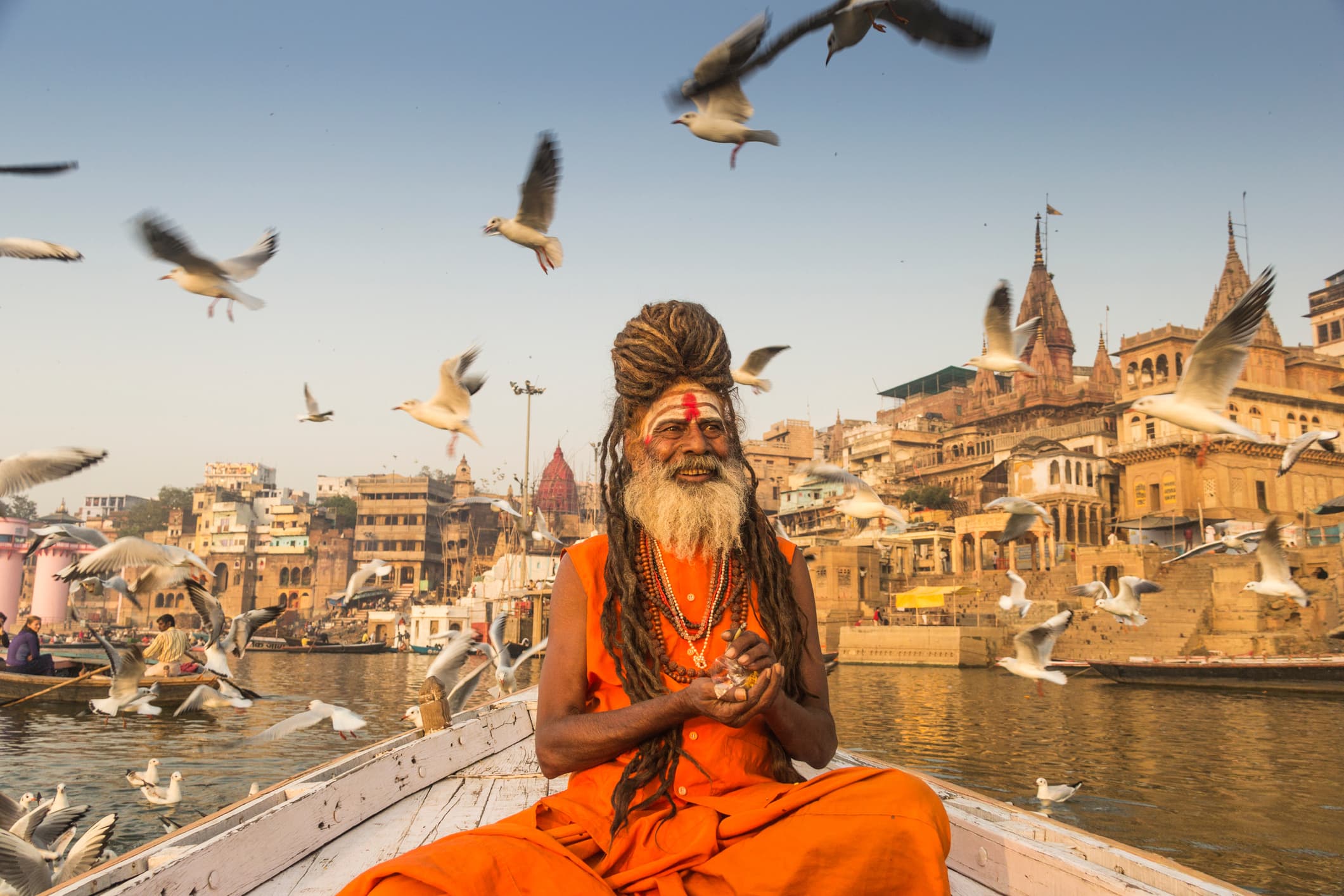Escaping the daily hustle and bustle is never easy — and in some places, it’s especially tough.
With a population of more than 1.3 billion, India is the world’s second most populous country. It’s expected to overtake China in 2027 to claim the number one position, according to the U.N. Department of Economic and Social Affairs.
Fly into one of India’s major cities and you’ll see for yourself. People are everywhere. Families on motorbikes, rickshaws packed with school children, buses and cars at capacity, and throngs walking along the roadside.
A busy street in Rajasthan, India.
John M Lund Photography Inc | DigitalVision | Getty Images
Many travelers’ first visit to India keeps them firmly planted in the fray, doing the classic Golden Triangle circuit — a week visiting the historic and jam-packed cities of Delhi, Jaipur and Agra — or gawking at the ghats of pilgrimage sites like Varanasi.
But India has serene areas too, remote places where nature takes center stage.
Houseboating in Kerala’s backwaters
A kettuvallam is a traditional-style houseboat with a wooden hull and thatched roof. They were designed to transport rice through Kerala’s vast network of canals, lakes and rivers, known as the backwaters.
A kettuvallam, or houseboat, in Kerala, India.
Aditi Das Patnaik | Moment Open | Getty Images
In recent years, kettuvallams have been turned into houseboats for tourists, and the 18-passenger Vaikundam is one Kerala houseboat that stands apart from the crowd.
A special hull allows it to navigate narrow canals and passages other boats can’t access. This means it can offer in-depth week-long cruises between the ancient port cities of Alappuzha and Kochi, covering about 100 miles through the maze of Kerala’s backwaters.
The wood-paneled and appealingly rustic Vaikundam has nine en suite cabins with large windows, a roomy dining area and a lovely outdoor observation deck at the bow.
There, the serene view is a montage of rice paddies, coconut groves, banana and betel nut trees and Chinese fishing nets — the latter a ubiquitous sight throughout the state of Kerala. Along the water’s edge, women slap laundry against rocks and men bathe, as generations have done before them.
A bird with a fresh catch in Kerala, India.
Courtesy of Scott Anderson
All the while, Kerala’s thriving airborne population swoops, calls and flaps across Vaikundam’s bow — from flycatchers, fruit bats and bee-eaters to parrots, larks and white-throated kingfishers.
“Our goal has always been to showcase the heritage of natural India,” said Vaikundam’s owner, Sanjay Basu, chairman of Adventure Resorts & Cruises.
Daily excursions range from village walks to canoe rides, traditional dance performances and temple visits. On festival days, “temple elephants” in gilded headdresses parade about in religious processions.
Seven-night cruises start at $425 per cabin and include all excursions and meals, which feature delicious south Indian favorites with fresh fish and coconut everything.
Cruising the Brahmaputra River
The 46-passenger Mahabaahu is a quirky river boat offering weeklong cruises along the Brahmaputra River between Guwahati and Jorhat, both in the state of Assam. Neither city is particularly attractive, but what lies between them is magical.
Children playing on the banks of the Brahmaputra River.
David Talukdar | NurPhoto | Getty Images
From its glacial beginnings in southwestern Tibet on the slopes of the Himalayan mountains, the surging river enters the northeastern corner of India and into Assam Valley. There, the Brahmaputra River dramatically widens and deposits tons of sediment that create islands of sand in the river.
Daily excursions range from village walks, visits to tea plantations and tours of ancient temples, to the high point — Kaziranga National Park, a UNESCO World Heritage site. A morning safari by jeep and elephant focuses on the park’s 2,200 greater one-horned rhinos. Indian elephants, water buffalo and swamp deer are also easy to spot, though only the lucky ones catch sight of a tiger.
Rhino mother and calf in Kaziranga National Park.
ePhotocorp | iStock | Getty Images
Back onboard, mornings begin with a yoga class on deck or on the sandy riverbank “beach,” and each day is fortified by delicious meals featuring India’s vast repertoire of cuisine. There’s also a small spa for India’s famous, oil-based Auravedic treatments.
Yoga along the Brahmaputra River, with the Mahabaahu river boat in the background.
Courtesy of Noni Chawla
Heading for the hills: rafting & trekking in the Himalayas
Ajeet Bajaj is considered a pioneer of river rafting, kayaking and expedition skiing in India. He has lent his expertise to train the Indian army and climbed six of the “Seven Summits” — the highest peaks on each of the seven continents, including Mount Everest. He plans to scale the last one, Denali, in 2020.
An adventurer and mountaineer from a young age, Bajaj founded Snow Leopard Adventures in 1990 to offer trekking and rafting trips in the Himalayas.
Trekking in the Himalayan Dhauladhar mountain range, near Dharamsala.
Courtesy of Snow Leopard Adventures
“With more than 73% of the Himalayas in India, a coastline of over 7,500 kilometers and innumerable rivers, there is an immense amount of wilderness in India,” said Bajaj.
One of Bajaj’s first tours, introduced nearly 30 years ago, is still one of his most popular — trekking and rafting in Uttarakhand, a hilly state at the foothills of the Himalayas.
Uttarakhand is a region of stunning natural beauty. Treks are framed by snow-capped peaks and green forests, while rafting on India’s revered Ganges River is a thrilling and exhilarating experience, both for the adrenaline rush and pristine beauty.
An eleven-night trip trekking and rafting through Uttarakhand starts at $1,400 per person.
